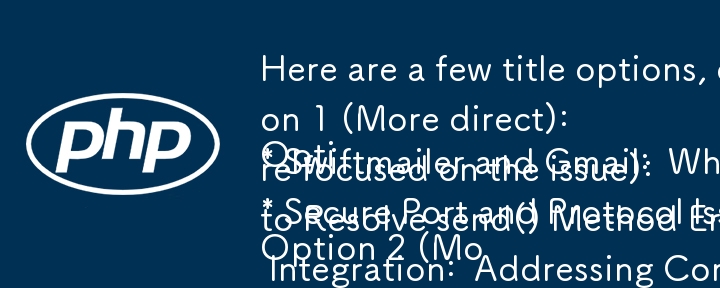Home > Article > Backend Development > Here are a few title options, each posing a question relevant to the article\'s content: Option 1 (More direct): * Swiftmailer and Gmail: Why is my send() method failing? Option 2 (More focused on
Here are a few title options, each posing a question relevant to the article\'s content: Option 1 (More direct): * Swiftmailer and Gmail: Why is my send() method failing? Option 2 (More focused on
- Barbara StreisandOriginal
- 2024-10-28 07:55:30414browse

Troubleshooting Swiftmailer with Gmail Integration
When utilizing Swiftmailer in conjunction with Gmail to send emails, it is essential to configure the parameters accurately. One user encountered an issue where the send() method of the Swift_Mailer object caused the program to fail. To resolve this, ensure that the following settings are correct:
Use Secure Port and Protocol:
The appropriate port for secure connections to Gmail's SMTP server is 465, along with the "ssl" protocol. Alter the code as follows:
<code class="php">$transport = Swift_SmtpTransport::newInstance('smtp.gmail.com', 465, 'ssl')
->setUsername('your-username@gmail.com')
->setPassword('your-password');</code>
Set the Mailer Instance:
After configuring the transport, assign it to the Swift_Mailer object:
<code class="php">$mailer = Swift_Mailer::newInstance($transport);</code>
Using these corrected settings, the send() method should now function properly, allowing emails to be sent from your Gmail account through Swiftmailer.
The above is the detailed content of Here are a few title options, each posing a question relevant to the article\'s content: Option 1 (More direct): * Swiftmailer and Gmail: Why is my send() method failing? Option 2 (More focused on. For more information, please follow other related articles on the PHP Chinese website!